Utah is not like any other state. Some Americans are still not sure Utah is a part of the union, and in its early history, of course, the U.S. Government refused to allow statehood for the land of Deseret. A “wicked place,” some self-righteous Christians complained.
Conversely, there are many Utahns who even today wish they’d stayed out of the USA in the first place. A few years ago, a friend of mine was chatting with a neighbor, a native born Blandingite, about the woes of the world. The man gazed east to the San Juan Mountains in Colorado and noted gravely, “Yeah, things are a mess out there in America.” For all these decades and years and centuries, Utahns and the rest of the country have maintained an uncertain truce.
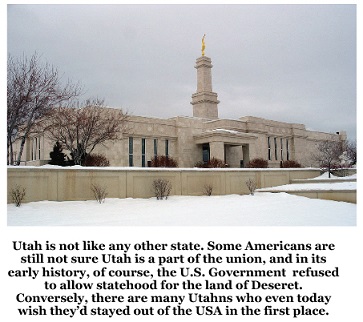
It’s easy to live in Utah if you are a member of the Church of Jesus Christ of Latter-Day Saints. Since Brigham Young led his people west from decades of persecution back east and settled in the Great Salt Lake Valley, more than 150 years ago, the LDS Church has dominated this state as no religion controls any other. Today Mormons still represent a significant majority of the state’s residents, they control the political arena, more or less run the schools, and set the moral tone.
Mormons are known around the world for the generosity and support they show each other–in a tight spot, no saint is ever on his or her own. Somebody always has their back. Whether that same kind of support comes as easy to the down-and-out Gentile next door, however, is a point for debate. I hear stories that go both ways, though most of my own experiences have been positive. Given their history, an impartial observer might argue that the Mormons have reason enough to instinctively distrust and even dislike the Outsiders, but no one can deny the mutual hostility that sometimes exists–it’s like worlds colliding.
One thing is certain, if you are conservative and LDS and you loathe liberals, you’ve got plenty of company here.
On the other hand, and strangely enough, it’s almost as easy to reside here as a virulent ANTI -Mormon. Though their numbers are much smaller, their voices are strong and often their rhetoric is even more strident than their hated adversaries. If you ask any Anti-Mormon, almost everything that goes wrong here in Utah is the fault of the LDS Church. From social issues to environmental questions, whether the consequence is big or small, it’s the “damn Mormons’” fault. And if no real sin can be attached to certain aspects of LDS Life, it nonetheless renders itself vulnerable to mockery and ridicule. From Jell-O to missionaries to sacred garments, nothing is off limits. I’ve wondered, in fact— if the Mormons had never stopped in Utah, what would my Anti-Mormon friends have done to entertain themselves?
This has, for many years, left me in a quandary. While I know I’ll never join the Church, I’ve never felt the animosity that some of my friends express so frequently and with such intensity. Until my recent partial escape to the Plains, Utah was my home for 30 years, since I left Kentucky. I’d forgotten, for better or worse, what was really going on, “out there in America.”
When I first arrived, the anti-Mormon sentiment was something I didn’t even know existed. I’d experienced the ‘rural vs urban’ conflict, but the split had never been defined for me by a specific religious denomination. My previous experiences, going back to my crush on the Ogden Girl from a few years earlier, had been happy ones. I’d always been treated well and though I found parts of the religion difficult to understand or accept, I enjoyed my experiences and admired their conviction and depth of faith. So when I landed in Moab and walked into the middle of this debate, I was surprised. Mormon Jokes were a dime a dozen. (How many saints does it take a to screw in a light bulb?) Everyone thought the wisecracks were hilarious.
I can’t claim I was above the fray either, or that I never indulged in Mormon Bashing myself. Like other young impressionable male idiots, I often went with the crowd and passed along my share of Mormon Jokes. When I was a seasonal ranger at Arches, for example, I seemed to routinely clash with hostile Mormon housewives when I tried to explain federal rules and regulations. Surprisingly, their husbands were often more generous to me than their brides. I began to tell the occasional Mormon housewife joke, based on True Life experiences. Still, my heart wasn’t in it.
Living for years in Moab, southeast Utah’s ‘Gentile Den of Iniquity,’ it was easy to screen the members of my social circle to only include those people who laughed at my jokes. It was a pretty boring existence. Still Moab was an oddly diverse town, where the oldtimers and the newcomers clashed but co-existed. I enjoyed the mix and I appreciated the miners and the ranchers, even if I didnt’ agree with them. It always felt to me that their lives had somehow been far richer and more interesting than mine was turning out to be.
In the 1990s Moab began to change. I could see it coming and I held out the futile hope that maybe we might remain the kind of town that I once dreamed it could be. But it was hopeless. Greed— Big Money, real estate developers, “green” carpetbaggers–they all descended on Moab like locusts, looking for the next Nouveau West town to exploit. In 2002, I faced a dramatic choice—leave Moab or go mad. I left Moab.
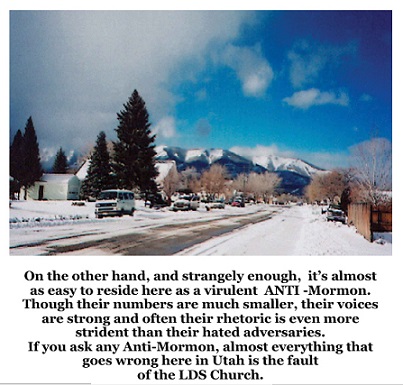
I considered my options, some as far away as Australia. But in the end, I decided to take the shortest path possible—55 miles south to Monticello. I would not become a Mormon. I would not join the Anti-Mormon ranks. I would simply be a Non-Mormon in the heart of San Juan County. When I shared my plan with my closest friends, they all offered the same admonition:
“Monticello? The Mormons will eat you alive. You won’t last a week.”
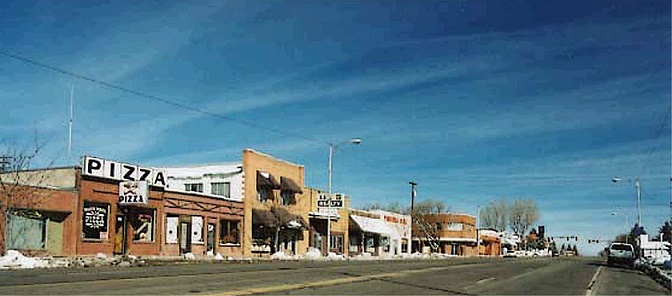
Neither the idea nor the town was foreign to me. After all, I’d owned some land down in San Juan County for years. But I needed a little place in town that had electricity so I could run my computer and printers for The Zephyr. Avoiding a chip seal job on Main Street one day, I detoured to 300 East and found exactly what I was looking for. The little cottage was owned by Doyle and Marilyn Rowley and was listed by Lex Realty’s Bennion Redd., Marilyn’s brother.
Bennion Redd was the patriarch of Monticello and one of its most respected citizens. I had known him for years, since my ranger days at Arches when we were required to attend law enforcement refresher course every spring. Bennion was the federal magistrate in our neck of the woods. He was kind to a fault and always invited us to stop by his Monticello office. His wife had died recently, he explained, and he could use the company. On a couple occasions I stopped by to say hello and realized his invitations were genuine.
(For more on Bennion from Stiles: http://www.sjrnews.com/view/
On this day, it was a business visit. I described the property and he explained that it belonged to his sister and her husband. He called Marilyn and Doyle and they came down to the office. (Everywhere in Monticello is 5 minutes away from everything else). We sat down in Bennion’s office and we haggled for about a minute. Doyle threw out a price. I counter-offered. Doyle came back again. I said okay. And that was that. We scribbled the price and terms on a piece of paper and Bennion said he’d draw up the papers. It would take about four weeks. We all shook hands.
The next day, I told a few friends in Moab about my big investment. They were skeptical. “Did you put down earnest money?” (No) “Do you have a contract yet?” (No) “Is anything notarized?” (No) “How do you know they’ll abide by the terms you scribbled on a piece of paper?” (We shook hands, I said…they thought THAT was pretty funny.) Four weeks later, I handed Marilyn and Doyle the down payment check, Bennion drew up the legal work, exactly as we’d planned, and on September 1, I became a Monticello homeowner. Starting my Monticello Years with Bennion made all the difference.
It was true, then and now, that I did not look like the average Monticello homeowner. As I unloaded a pickup truck of furniture, my new neighbor, Todd Westcott, walked over to say hello and to welcome me to town. My cottage is tiny and as we made our introductions, he commented on the size…
“This is a pretty small place for you and your family,” he noted.
“Well,” I said. “Actually I don’t have a family.”
Todd looked bewildered. “No kids?’
“Nope.”
“You’re not married?”
“Uh…no,” I replied. “But I do have two cats!”
I realized I wasn’t making matters better. But he quickly adjusted to his new neighbor’s solitary lifestyle. Our homes were separated by a small field. Behind us sprawled a beautiful horse pasture. My view to the east past the horses stretched all the way to the San Juans in Colorado. It was like having Lone Cone in my “backyard.”
But I worried about that field. I’d just left Moab, where fields and pastures were vanishing faster than I could shed tears for them. And it wasn’t just the pro-growth development gang that was carving up the county. Some of the “greenest” environmentalists in Utah were busy building eco-condos and insisting they weren’t doing it for the money. So I wondered how long a vacant field in my backyard would survive.
One day I heard that Todd had bought the small field between us and the big pasture to the east. Someone suggested that he planned to subdivide it. I felt sick. A few days later, I saw Todd in his yard and waved him over. I figured I’d rather get bad news straight from the source that keep grieving over rumors…
Was it true, I asked? Had he bought the land?
Todd nodded. “Yep. For better or worse.” It was a big investment, he explained.
So I asked the question: “Is it true you’re building a subdivision?
He looked at me like I was crazy. “What?” he asked. “Where’d you hear that? Nope. We bought this land so they WON’T build houses on that field. I love that view out the window in the morning. I don’t know what I’d do without it, so Amy and I decided to buy it…we’re gonna grow alfalfa.”
Growing alfalfa is no easy task and once, with a cutting planned and rain on the way, Todd was out until 4AM, trying to get the alfalfa cut and baled before the storms came. The next day, he saw me in the yard and came over to apologize…to apologize!..for making noise during the night. In Moab, his concern might have been real. New Moabites would have complained about decibel levels after 10 PM and the emissions from his tractor. For me, the sound of his equipment cutting and baling was music to my ears.
I was confronted with a strange paradox. Here was my neighbor, a devout LDS/church-going conservative, who owns ATVs and 4WDs and even has a motorized bike with training wheels for his youngest boy, who works in the energy industry—here’s Todd showing more resolve to keep Monticello’s open space open than my richest, most politically-correct enviro pals in Moab.
My new Life in Monticello followed that theme. Its citizens were at least tolerant, if not totally accepting. Nobody egged my car or put peanut butter on the windshield wipers. One day I stopped at the insurance office to check a premium. It was my first visit to the Monticello branch. A big serious, crew-cut, cowboy-type with a snap front shirt sat behind the computer. I handed him my papers and he punched a few keys. Finally, still looking at the screen he said flatly, “I like your paper.”
I was startled. “You do?”
“Yep.” Long pause. “A lot of my friends say I shouldn’t read The Zephyr. I tell them they should.”
I was almost speechless. “Thanks,” I finally mumbled.
“I think you’re trying to be fair at least,” he explained. “And I don’t agree with you on a lot of stuff. For instance, I got eight kids.”
That’s a lot,” I said. “But I don’t have any kids, so that knocks our average down to four.”
Bill Boyle, editor of the local newspaper, and I became good friends. Early on, he asked me if I’d be interested in sharing some of my Zephyr stories in the San Juan Record. I thought he was kidding. My rants in The San Juan Record? At first I thought it better to lay low. I can’t stand newcomers who arrive in town on Sunday and by Monday are trying to tell their new neighbors how to live their lives. So I imposed a five year moratorium on myself. No Stiles rants. But finally Boyle convinced me the time was right and so my essays, some written for The Zephyr, some exclusively for the Record began to appear. The response was gratifying. People I’d never met approached me at the market or at the post office to say hello…
“Well…I read your piece this week.”
“Yeah?”
“Some of it was pretty good. Other parts of it…I didn’t like.”
“Fair enough.”
And it was.
Bill deserved credit for daring to print my stuff in the first place. And I was grateful that even the more conservative parts of Monticello would at least give me a read. Of course they loved my essays when I was critical of SUWA or the tourist economy, but they also read (and at least tolerated) my rants on population, consumption and the near-extinction of the buffalo. Even my “Why I Never Became a Mormon…parts 1 & 2″ were met, in most cases, with good humor and thoughtful, sometimes introspective assessments.
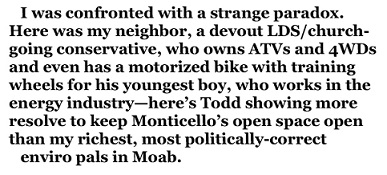
On the other hand, I failed to connect with the Anti-Mormons in any significant way. Maybe I was still put off by the rhetoric. Former Monticello native, author Amy Irvine, practically created a template for Anti-Mormon vitriol when she took extraordinary measures to explain how much she loathed the town, in her book, “Trespass: Living on the Edge of the Promised Land.” Irvine found little to respect during her brief time as a resident. A self-proclaimed ex-Mormon and a 6th generation Utahn, she describes the moment when Mormon missionaries come to her door in Monticello:
‘“Come back and preach at me,’ I bellow, ‘when you’ve made love—to someone other than each other. When you’ve seen death. When you’ve walked—not driven—across the desert.’
It was just the first of many hurled Irvine insults that portrayed Monticello in as ugly a light as one can imagine. She mocked the people, their conservative values, their modest dress code. She even criticized the lack of a good merlot in a little Mormon town where 90 percent of its residents don’t drink alcohol. Or the pitiful variety of cheeses! It should not have come as a surprise when she wasn’t embraced by the community. Or that her words left bitter feelings.
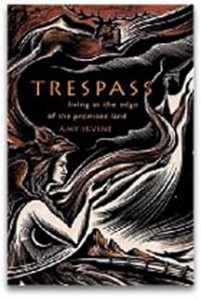 Irvine departed years ago, but there remains a solid group of Anti-Mormons who share her loathing for anything LDS. Because I’m not a Mormon and because my views are more liberal, I suppose it was assumed I was “one of them.” It created some awkward moments for me. For example, I was at the post office one day, talking to Postmaster Dorothy when a woman I barely knew stopped to invite me to a party.
Irvine departed years ago, but there remains a solid group of Anti-Mormons who share her loathing for anything LDS. Because I’m not a Mormon and because my views are more liberal, I suppose it was assumed I was “one of them.” It created some awkward moments for me. For example, I was at the post office one day, talking to Postmaster Dorothy when a woman I barely knew stopped to invite me to a party.
“You never come to our parties!” she complained. “And you don’t have to worry..none of ‘those’ people will be there.”
“‘Those’ people?” I asked.
“You know,” she laughed. “The people with the funny underwear.”
I grimaced. “I like ‘funny underwear.’”
She tried to figure if I was joking. Finally she backed off, looking confused. That was my last invite.
The Mormon Bashing continued and I retreated farther from my old friends. But it followed me, even to The Zephyr facebook page. Recently I had posted a history story about the uranium tailings cleanup in Monticello. Residual radiation from the old mill had caused cancer rates to soar in the 80s and 90s. A Monticello resident posted this on my page:
“I hope these Mormons get cancer from the background radiation under their houses and radon seeping up through their basements and die a slow horrible death, then burn in hell where they belong.”
I removed the comment and blocked the user from ever posting on the Zephyr page again. But it still rankles.
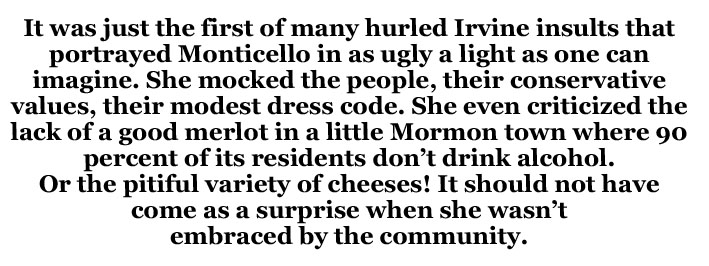
I don’t include these comments to further inflame an already volatile situation, and I have, in fact, seen the same kind of vitriol from members of the LDS community, but to remind my “progressive,” Mormon loathing friends that ugly language is hardly limited to one side. If there is an epiphany to be found here, it’s not that I find myself agreeing with local Mormons on a variety of issues, it’s that I find a higher level of tolerance for my divergent viewpoints.
What we all seek, or at least should try to, is the ‘live and let live’ philosophy that many religions, including Christianity embrace. I’m not a very religious person but if there was one quote from the Bible that always resonated with me, it was, “Do not worry about the speck in your brother’s eye, worry about the log in your own.” I believe Jesus Christ said that.
And we all fail in trying to live by that standard.. While I resent the condescending attitudes of so many Anti-Mormons, I am troubled by judgmental behavior wherever it is found. For example, it still bothers me that the LDS Church encouraged its members to provide financial support for Proposition 8 in California a few years ago. The purpose of the vote was to ban gay marriage and it passed, but years later, the Supreme Court tossed out the restriction.
Opponents of same sex marriage, including the LDS Church, decried the court’s ruling, but there is an irony here that has been lost on most members of the Mormon faith. Now that the judicial system has offered a final decision on same sex marriage, one of the next questions facing the courts will be to determine if governments have the right to prohibit citizens from having more than one spouse. Sound familiar? If a man or woman can choose to have a partner of the same gender, how can the government restrict the number of partners we choose to have? The landmark case on same sex marriage may someday be the gateway decision that leads to the reversal of the ban on bigamy/polygamy. It’s a practice deemed immoral by some, but then…who’s to judge?
Finally, if my modified attitudes could be traced to one moment or one event, I would once again pay tribute to one of the kindest men I have ever known. Let me offer one last story about Bennion Redd.
I have always been a proponent of decommissioning Glen Canyon dam, an idea that, at this moment, is making many of you in San Juan County and conservatives everywhere shudder with horror…
“DRAIN LAKE POWELL??? ‘There goes that EcoFreak Stiles showing his True Colors again!”
But I will always stand by my moral conviction that the dam should never have been built, that it submerged (but didn’t ‘destroy’) one of God’s most amazing creations, and that even from an economic standpoint, is more destructive than constructive. Whether you disagree or not is an argument for another time. The point of this story resides elsewhere.
In the Spring of 2003, the Glen Canyon Institute (GCI), which was founded by another of my favorite Mormons, Dr. Richard Ingebretsen of Salt Lake City, gave me an award for my efforts to shed light on Glen Canyon and other environmental issues affecting the West. There was a small ceremony and it was reported in the Moab ‘Times-Independent.’
I had already found myself locking horns with my old SUWA pals over the impacts of tourism/recreation—the ‘amenities economy’—on southeast Utah and though they all shared my views on the dam, I didn’t hear from any of them. It wasn’t unexpected, but I did feel sad that my efforts to be a more evenhanded journalist had led to this kind of animosity.
But a few days later, a letter came to me from an unexpected direction—from Bennion. He wrote, in part:
“I read the complimentary article about you receiving the Glen Canyon Institute’s 2003 David Brower Award…Congratulations–you certainly deserve the honor.” He mentioned my friend Rich as well: “(He) was a good friend of my nephews. He was always a passionate person…and certainly has put his heart and soul into his advocacy concerning Glen Canyon. I can see similarities between you.”
Bennion closed his letter, “You are very dedicated in the causes you support. Keep it up!”
I was fairly certain that Bennion and I were not on the same page when it came to the matter of Lake Powell, but he saw fit to congratulate both Rich and me for our passion, even if he thought we might have been a bit wrongheaded. That meant more to me than words can express.
What have I taken away from all this? As the country becomes more polarized and combative, just being able to express an opinion contrary to the prevailing mood of the crowd you run with has become a challenge. For me, discovering that I found more tolerance in a small, conservative Mormon town than from the “progressive/liberal” pals I once regarded so highly has been a life lesson that I’ll never forget. Not all Mormons, I realize, are as gracious as Bennion. Not all non-Mormons are virulent Anti-Mormons. But, these days, few are even willing to consider getting along with their “enemies” on the other political side. We should take our friends when we find them. And anyone who can leave behind their lockstep judgment of others, Mormon or Gentile, is a friend of mine.
Jim Stiles is Founder and Co-Publisher of the Canyon Country Zephyr.
To read the PDF version of this article, click here and here.
Don’t forget the Zephyr ads! All links are hot!

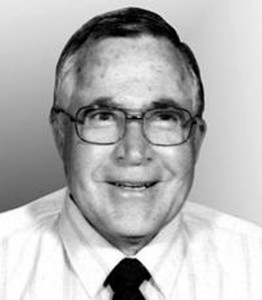
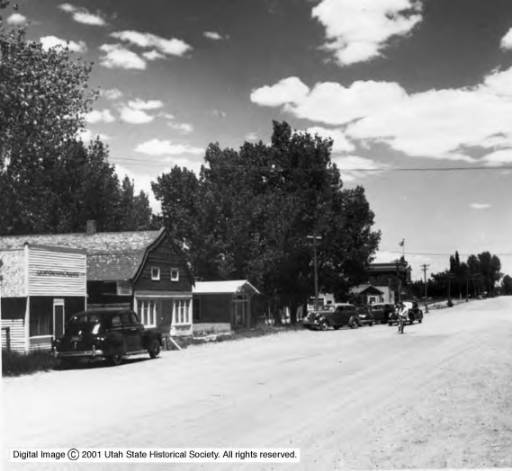


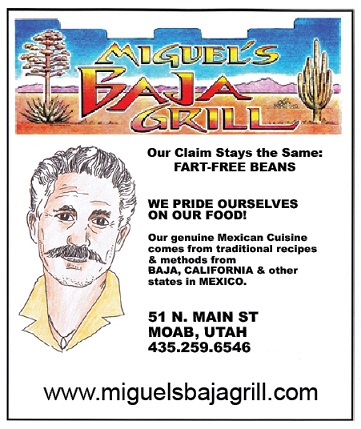
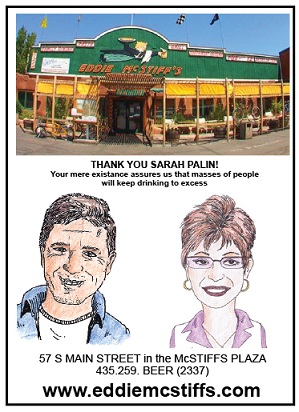
This is an excellent and forthright essay, and many of its points resonate strongly regarding false labels and generalizations. The “progressive-liberal-environmental” crowd (speaking of generalizations) does indeed often come across as elitist. Though I share many of the ideas and thinking of some of these purportedly “left-wing” advocates, I also believe in my country roots that they too often betray an arrogance and inability to identify with the greater grassroots community that isn’t helpful to their causes.
In my journalistic work – including quite recent work – I’ve found that a willingness to write about topics of controversy if done honestly will win you allies among those even who disagree. Lack of courage, on the other hand, in an attempt to placate the community (or your biased beliefs about it) will reap the opposite result.
The vast majority of the American press is indeed indoctrinated, fearful, lazy and quite often corrupt. No other institution has done more to degrade free-thinking or promote like-minded Know-Nothingness than the American “free press” in general. No one has to censor their work in America, the journalists pretty much censor it themselves, and that includes their own biases and prejudices toward a variety of people, faiths, beliefs and worldly circumstances.
And as a journalistic fish that has been swimming upstream against a variety of obstacles for years, I do appreciate pieces like this that simply come out and say what they mean, tactfully but also without cowardice. I also agree that the supposedly monolithic Mormon culture in reality consists of many diverse individuals and families that are still quite able to form their own views on various matters of significance.
Thanks.
AAAhhh Jim there is one person asking from up above …. DID YOU PAY YOUR TITHING … Yea I read your article and GENE SCHAFER keep yelling that in my head to ask you so I did
Rhonda!!! That’s weird…I thought I could hear Gene as well…but none of it is re-printable! If I had a nickel for every time one of his LDS friends walked by the shop and Gene yelled out, “Hey! Come on in for a beer! Or would you prefer a shot of whiskey?” I’d be a rich man.
But what’s interesting to me is that the two biggest funerals in San Juan County in recent memory were for Gene and Bennion. Gene—the beer drinking, plain speaking (to put it mildly) Gentile and Bennion, the devout Mormon. Very different in some respects and very similar in others. Both of them great men in their own way. That’s why so many people in San Juan County loved both of them, whatever their religious preferences (or lack of them) might be.
JS
Really enjoyed this. I believe I was one of those who thought you would be shunned in Monticello.
Bruce
A touching story. Thanks!
I had a painful moment years ago when a woman who taught writing in our local college, and who was a key member of our little writing group, told me Carl Jung was a sexist as she handed me two of his books I’d given her to read. I was dumbfounded and speechless.
It wouldn’t have hurt so much if I hadn’t respected her highly. But eventually I realized that she’d allowed herself to get caught in her rigid ideological gender program and couldn’t give Jung credit for having key insights about the psychology of both women and men DESPITE the patriarchal culture in which he was raised. Nor could she give him credit for breaking through the strictures of that culture.for the most part.
So while I think ideological differences need to be acknowledged, flat-out rejection of and scorn toward those who differ with us along these lines is rarely justified. Life is a lot more interesting than that!
And fun, too.
Thanks, Jim, for an engaging read. As a lifelong, even 5th generation Moabite, a gentile with deep Mormon roots, this resonates.
What an amazing article. It was absolutely something I needed to hear. I stumbled across your site tonight and have not stopped reading. Thank you for this piece. I wish the SL Trib\Deseret would print it and live by its precepts. In fact, I wish we all would.
This truly was a great moment in understanding each other. I’m emailing it to everyone I know. Wow. Thank you.
Jim – I enjoyed this article and will probably be following you more. Based on what I see here you share the same pursuit of objectivity, balance, perspective, tolerance, fairness and understanding. The pursuit of these is very challenging and in my humble opinion follows a higher path. These are qualities that seem to be lacking in today’s divisive instantaneous, politicized, propagandized environment.
I gained more insight with this read which is all you can ask for from an article.
Great article, Jim. As an expatriate East Coaster trying to find his place in SE Utah for nearly thirty years, your words resonate deeply.
Thank you for your kind words about my grandparents, Doyle and Marilyn Rowley, and my great-uncle, Bennion Redd. It’s good to know that I’m not the only one who has a soft spot for Monticello and the upstanding people who have lived — and still live — there. I have long thought that a very telling sign of a person’s character is not in how he/she reacts to agreement with others, but to disagreement. I think I have quite a legacy to live up to, no?
Well said. I find your evenhandedness refreshing and sorely needed, both in Utah and in most arenas of political and social debate in our nation. Keep it up and fill the ranks with reasonable, if not like-minded, people who can respectfully disagree and love each other.
I think you depict a very accurate version of what what its like to live in Monticello and thank you for the great stories of my family and friends.
Jim! I enjoyed so much your article about the people in the wonderful little town at the base of the blues, where I grew up! I am Bill Boyle’s niece and have enjoyed your articles for years! He always speaks highly of you and the Zephyr. Thank-you for finding the words to express so beautifully what Monticello is. The Anasazi called San Juan Co. “the backbone of the earth.” Truly Monticello embodies that with wonderful people like Bennion and Gene. I think you should move back and enhance the atmosphere there even more!
As a Mormon who has lived in Utah, Idaho, then California, I have to say this was delightful to read. Great story.
Jim: thanks so much for this refreshing view of “my people”. Doyle and Marilyn are my uncle and aunt, and I, too was born and raised in a small Mormon community in SW Utah. My grandfather, W. Clair Rowley, Doyle’s father, was Iron County’s version of Bennion Redd. Very devout but very open and supportive to everyone. It’s no great surprise that Doyle and Marilyn somehow found each other. I myself am a very active Mormon, but definitely do not “fit the mold”, which mold, I believe, was created not by people within the church, but by biased outsiders with an agenda looking in.
I’ll be following your writs more regularly.
I stumbled upon this article through Facebook and being a Mormon raised out of state I have always been bothered by the polorization of Mormon’s and Non Mormons in Utah. As an active Mormon with fairly liberal views I have at times felt isolated both in and outside my faith in Utah. My husband and I have discussed this very topic many times and have come to the conclusion that those whose opinion and friendship is soley based upon your religious affiliation or lack there of, are not friends worth having. Plus, Todd Westcott is my cousin. I was glad he was mentioned because he and his family are good people. I am also wondering if you might have bought my grandmother’s little house? Anyway good read Thank you.
Jim,
I’m admittedly a stranger to San Juan County, but I a friend from Eastland posted your article and I couldn’t help but keep reading. In a time of increasing divisiveness in our communities and country, thoughts like this really ring true to me. As someone engaged in the “political” battle, your advice is a helpful reminder that we often have more in common with our adversaries than we might think.
Thanks for your thoughts. And as someone on the opposite side of the political aisle, keep fighting the good fight.
Jon Cox
Utah House District 58 Representative
Jim,
All of your work is great but this is arguably the best. After growing up in Utah, I had the pleasure of living for several years in a Chicago suburb and a devout Catholic neighborhood. My neighbors there treated us as family and I will be forever grateful. I likewise am grateful that you have had a good experience living in Monticello.
I am frequently frustrated by some of the strange cultural quirks that exist in Utah because of the huge presence of the church. One one hand you have the tenets of the religion, then on the other hand you have cultural elements spawned in certain Mormon neighborhoods throughout the state. Most of the time, those quirky cultural elements have nothing to do with church doctrine.
I wish I still lived in Monticello and could get to know you personally. I am certain we would get along.
Hi Jim,
I saw your article posted on a friend’s FB page and quickly reposted it to my own after reading it. I am a multi-generational Mormon who has had a lifetime hot and cold relationship with the church. In the early 90’s I moved from the West to Ithaca, NY, where I expected to find some space to spiritually/emotionally breathe. What I discovered was a shock. Right leaning religious people had no corner on the intolerance market.
In fact, for the first time ever, I was rejected by a would be VERY liberal friend because of my association with the Mormons. Having never, ever been rejected like this from my Mormon community, no matter where I landed on the Mormon spectrum, I realized that to find a loving, tolerant community, I needed to look no farther than my own ward building.
Because I am often a fence sitter, I have had extensive congress with both the Mormon community and the “world” community. And my experience in NY has been consistent over the years. I am, from time to time, severely judged by liberal “haters” who preach tolerance and practice none. Whereas, I have never experienced rejection from my church community, ever.
Thank you for putting this out there. It is much needed fair and balanced viewpoint that I am proud to share.
Bennion really was amazing! I know him as grandad but you’re right, he was such an amazing man. I miss him a lot. Thanks for your article, I really appreciate it and I agree whole heartedly with what you’ve said about being/making friends with those the are kind and good people regardless of religion.
but you’re right, he was such an amazing man. I miss him a lot. Thanks for your article, I really appreciate it and I agree whole heartedly with what you’ve said about being/making friends with those the are kind and good people regardless of religion.
Thanks again!
Read your SLTrib piece this morning, left a comment there, and then turned to your Zephyr, which I’ve been reading over the course of the day.
I liked the tone of this essay a lot, the openness and reasonableness of it. I used to belong to the Mormon Church and don’t now, but it’s clear to me that a lot of what is good about me is due to that upbringing (and a good portion of the bad as well).
Sam Rushforth and I have just published “Wild Rides and Wildflowers,” a book about mountain biking and Mormons and botany and our troubled masculine identities and so on, and in the book there’s this”
Scott tells me he’s just got a letter from his son Nate, who is a Mormon missionary in Hong Kong. “I sent him Ed Abbey’s response to a missionary,” Scott says. “‘So you’re going to Christianize the savages. Aren’t they savage enough already?'”
“How did Nate answer?”
“‘Dad,’ he wrote, ‘I love you.'”
“You’re a lucky man, Abbott.”
To war against the Mormons would be to war against my son and against parts of myself. But to stay with them I would have had to war against my gay brother, and so, given that paradox and the fact that I am an atheist anyway, I left.
A final note, if I may. I read your work and am reminded how much I love that country (I grew up to the southeast in Farmington, N.M.) and those little towns like the one you describe so well.
Oddly enough (given your reading of Trespass,” Amy Irvine reminded me of the same things and made me admire the people of Monticello much like your writing does. She did say some strong things about the place and the people, but also about herself and her cursed disability to live well with others.
Her statement to the missionaries you quote does feel glib there at the end of her description, I’ll give you that. But since it is in the context of their standing there “poised to pierce the most vulnerable parts of my psyche,” since the real battle is not between her and the missionaries but between the two parts of herself, and because it comes at the end of a long section about her family — “so many men for whom I have deep love and admiration — my grandpa Blaisdell, his sons and brother, the neighbor who baptized me — they all held the priesthood,” i like to see that glibness as one of many revelations of her own insecurities and instabilities — the very things that make me trust and admire the book.
In my reading, she’s trying hard to inhabit two worlds that are often battling, trying to trespass. Her yearning to be like the rancher, for instance, who watches the deer run across the road and who loves the land deeply and who returns, in her mind, to a family she wishes she had follows directly after she finds the dead coyote hung on the barbed wire and curses ranchers who would do that.
But that’s my reading. Thanks again for this thoughtful essay
Stiles. Thanks. An excellent piece.
Thanks for continuing to hold on to the radical middle Jim. It’s not surprising you are doing well in Monticello, because at the end of the day, people respect those who don’t judge and can think for themselves. You have always had a great way of defining a shared commonality with those differing politically or environmentally. For example, I remember how you, the leftist environmentalist, expressed more favor of cows than condos when you lived in Moab. Carry on fine Sir and tell Mr. Boyle hi for me.
So good, Jim. Why do i not remember reading this nine months ago? I want to really commend you for pursuing truth and doing it humbly. Too often the written word seeks to be clever rather than real, but this is real.
Hey Stiles: Good Stuff!
You have a way of stringing words together that makes them a pleasure to read, kinda like that Abbey feller had. I appreciate your sentiments. I like your candor. Your best stories are personal, yet not self-absorbed. Again, good article.
–Randy
Reminds of Wallace Steger’s take in “Mormon Country”
Er “Stegner” !
It is with great joy that I read this peice. It was my exact experience living in Moab in the early 90’s. I am so very glad to hear you have found a measure of happiness in Monticello and look forward to reading more of your writing. Thank you Mr Stiles!
Thank you for an excellent post. At various points in my life, I have lived in Utah, Washington, Spain, Arizona and Missouri. I have also travelled extensively around the United States, and your article really struck a chord with me. I am LDS, and am very grateful for what you had to say. As a child growing up in Utah, I still very clearly remember the kid in my first grade class that wasn’t a Mormon and how strange the rest of us thought that was. We didn’t mean to be cruel, but in retrospect I am sure that we, at the very least, made him very uncomfortable. That moment has stuck with me for my entire life, how I never want to make someone feel out of place or uncomfortable because they are different. I wish that everyone could feel a little empathy for “that kid.” Years later, that kid was me as a Mormon living in the buckle of the Bible belt, where I have actually met people that are looking for the horns on my head because they have been told that Mormons are devils and have horns (yes, I mean that quite literally). I have had people refuse to do business with me because I was a Mormon. A few times a year there are flyers, DVDs and notes of anti-mormon literature left on my porch from mysterious people that are trying to save me and my family from damnation. Mostly, I just feel sorry for them. And for a few that I get to know personally who are truly grieving because they feel that my soul will be damned because of my religious choices, I feel a great deal of compassion and love.
It is constantly amazing to me nowadays where it seems to be more important to be “right” or “funny” and less important to be “loving or “compassionate.” Your post gives me hope that there are more people just like you out there that are not afraid to give love, service and friendship to those in need – whether we are of the same creed or not!
In any case, thank you. Your post was much needed and appreciated.
Great piece, Jim.
“Jimbo”:
Very thoughtful piece which is why I love reading you. What you should is a truly democratic mind (NOT big D Democrat).
It is very difficult to really listen to others POV when we have a disagreement. I attempt to do this by not:
* Name calling.
* Cursing.
* Making fun of the opposition.
* Try to document what I can.
* If it is an opinion I am stating, I say “In my opinion” which in my mind shows I may not be able to document or it is a value statement which is clearly not a fact.
* If I disagree w/ a POV and don’t see the logic or factual basis, I say “I don’t understand what you are saying. Can you state in another way?”
Keep up the good work and hope to see you again in Louisville.
Hi Jim,
I was looking for some history of the Native Utes and the Mormons at the beginning of European man’s attempted settlement of Moab. When I came across this article, it held me in rapt attention. You have grown over the years and I’m happy to read and see the evolution. I appreciate how much you put yourself out there.
Great article and it was great to reconnect virually with you after all these years.
I always thought the same, that I had more in common at times, with Mormons who did things with their hands (and kindly invited me to use their commercial canning facilities as an example), who had time to sit, talk and listen, then “my own” leftist people. Ha! Funny!
Michelle Wurth,
Your old neighbor across the street on Locust Lane (who is out of state now, but a desert lover through & through).
Having heard what my brother in law, born and raised in Monticello, a farmer, son of a Monticello farmer, brother of a large LDS family of Monticello farmers has said about Stiles over the years, I appereciate that he has not sensed small town hostility toward him. In a different era, Jim would have been ridden out of town on a rail.
Make no mistake about it, voting in San Juan County in the 2017 elections as reported in the San Juan County record indicates that San Juan County does not represent Utah in general. They are much more reactionary and much more radical than the state in general. It is not about Mormon v. AntiMormon, but about an isolated enclave of the progeny of tough pioneers.
Lingering perceptions from childhood told me long ago that Moab was a different animal than Monticello and Blanding. Maybe this is the effect of a cousin of mine running an auto dealersip in Moab, whereas in childhood my relationship with Monticello was the horse’s face on the Blue Moutains and a few baseball games there. We typically drove through Monticello to get to Moab or Phoenix.
We may have gone to church in Moab and/or Blanding. Pretty sure on Blanding. Never in Monticello. We travelled the old Mormon trail with 120 jeeps from Blanding to Hole in the Rock in Glen Canyon the year before it became an attraction for a few LDS boaters on the new reservoir, Lake Powell.
I went to jr. and high school in Cedar City. Utah was Zion to me; Salt Lake City was Mecca. I earned my Duty to God award when I was 16–75% attendance at all church meetings for the four previous years as well as a host of other service requirements.
As a young adult, my team lost in the first round of a regional LDS basketball tournament in Monticello. By then my sister was married to a Monticellan and had three adorable kids. One of those adorable kids had an adorable kid who was in one of my advanced math classes last year.
But one of those adorable kids of my sister was busted for smuggling meth into the US and did 90 days in the San Juan County jail. Her male, nonMormon accomplice got 15 years.
And I have other horror stories about these sons and daughters of the sons and daughters of the sons and daughters of Mormon pioneers. The Reds and Blacks were names I heard infrequently in childhood. Theyvwere the very petit bourgeois of rural SE Utah.
Folks are folks. Mormons living along the LA-Las Vegas-Salt Lake corridor have culture older than those in San Juan County. Cedar was a hip little town in the 60’s with SUSC pulling in good pot and hard drugs to feed the appetites of the children of a population that was 98% LDS.
I heard Sgt Peppers for the first time in the bedroom of a friend whose father had died in a crash while testing airplanes in the era of right stuff test pilots. The military once blew the hell out of hill near Cedar–underground detonation. A few miles South and West they were testing nukes and allowing the dust to waft over St. George and points east.
We went to Arizona City to see the polygamists. Boring trip.
Little Enoch, now contained within Cedar City, was an attempt by the LDS church to do the United Order, the proper organization of economy in heaven according to LDS founder, Joseph Smith. It was–dare we say it?– communism. This experiment failed. Enoch still exists but the ideal form of Enoch exists only in heaven. The people of Enoch call themselves free market conservatives.
Mormons have a rich and old culture. Mormon culture has some good points and some bad points.
But nothing about Mormonism is as evil as virulent Anti Mormon claims. I’ve never found one of these transcendently hateful people ever made any sense to me.
I’m no longer Mormon. My honesty and principles made me choose to leave this faith and, therefore, this culture.
Some Mormons are good folks, some are assholes. Some things they, as a people, do well., others things they do dumb. They started as a radical social and religious organisation, but are now just a quiet, back-looking quasi-Christian religion.
As a liberal, I hardly pay attention to them any more. Just folks like any other.